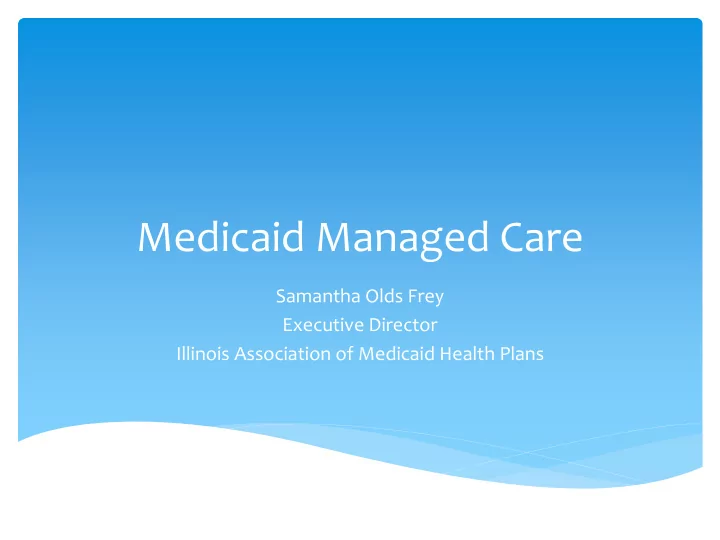

Medicaid Managed Care Samantha Olds Frey Executive Director Illinois Association of Medicaid Health Plans
Illinois Association of Medicaid Health Plans
Medicaid Care Coordination Programs ∗ Integrated Care Program ∗ Serves Seniors and People with Disabilities ∗ Medicare Medicaid Alignment Initiative ∗ Serves Dually eligible, those enrolled in Medicare & Medicaid ∗ ACA Adults ∗ Serves the newly eligible Medicaid members ∗ Family Health Plan ∗ Serves the traditional Medicaid population
Medicaid Models of Care Coordination ∗ Managed Care Organizations (MCOs) ∗ Traditional HMOs ∗ Managed Care Community Networks (MCCN) ∗ Provider or county based but function similarly to an MCO. ∗ Accountable Care Entities (ACE) ∗ Provider based serving ACA and Family Health Plan population in a fee for service setting. ∗ Care Coordination Entities (CCE) ∗ Provider based serving seniors and people with disabilities in a fee for service setting.
What Each Care Model Means for Providers: ∗ MCO & MCCNs ∗ Bill Care Coordination Organization. ∗ Receive necessary Prior Authorizations from Care Coordination Organization. ∗ Prior Authorization requirements may differ from the State’s. ∗ ACE & CCE ∗ Bill the State. ∗ Receive Prior Authorizations from the State. ∗ Follow existing fee-for-service standards.
Challenges for Local Health Depts. ∗ Several MCOs in a given region. ∗ Have to learn how to contract and credentialing with MCOs. ∗ Have to learn a new billing process. ∗ May have to learn Medicaid billing at the same time. ∗ Have to learn several utilization control models. ∗ Timelines and details about the transition changed regularly.
Challenges for Health Plans ∗ Coordination between Providers, HFS, & Health Plans. ∗ Patient and Provider confusion regarding the timeline and process for care coordination. ∗ Small presence of Care Coordination Organizations in Illinois Medicaid. ∗ A lack of integrated healthcare in Illinois.
How to overcome the challenges ∗ Communication: MCOs, IAMHP, & HFS want to work with providers to address the challenges we all face. ∗ Focus on what we have in common: The Member. ∗ Recognition of the benefits of Care Coordination.
Public Health Dept. specific concern: Working with Health Plans ∗ Providers must be Medicaid providers if they want to participate in a health plan’s network. ∗ Providers must be able to bill for services that they provide. ∗ There are back office organizations that have assisted other provider types. ∗ Educate health plans on the services you provide and the populations you serve.
Public Health Dept. specific concern: Staff Turnover ∗ Health Plans recognize that during the transition to managed care there has been staff turnover and this has caused a point of frustration for our provider partners. ∗ While Health Plans cannot eliminate staff turnover, they have committed to handling it better. ∗ What have Health Plans done to address this concern? ∗ Regularly updated contact list for provider relations team members. ∗ Escalation contact if your provider relations member is not providing you with the information you need. ∗ Increased effort to notify providers if a provider relations member has left the organization.
Public Health Dept. specific concern: MCO responsiveness ∗ Health Plans have an internal policy to respond to provider inquiries and concerns within 24 to 48 hours. ∗ Health Plans recognize that for various reasons they have not always been able to meet this goal. ∗ What have Health Plans done to address this concern? ∗ Health Plans have increased their staff significantly. ∗ Regularly updated contact list for provider relations team members. ∗ Escalation contact if your provider relations member is not providing you with the information you need.
Public Health Dept. specific concern: Provider Portals ∗ Health Plans recognize that during the transition provider portals needed improvement. ∗ What have health plans done to improve their provider portals and websites? ∗ Health Plans ensured that provider portals were easy to locate. ∗ Health Plans have moved provider manuals to the front page of their website. ∗ Plans have created frequently used documents and made those easier to locate. ∗ Plans have included phone numbers and contact information within the portals as well.
Public Health Dept. specific concern: Timely Payment & Billing Concerns ∗ Health Plans recognize that there are billing concerns regarding the transition to care coordination. ∗ Plans are required to pay within 30 days of a clean claim. ∗ 90% within 30 days and 99% within 90 days. ∗ What have Health Plans done to address these concerns? ∗ Health Plans are committed to providing additional training to any organization that requests it. ∗ What can providers do to remedy billing issues? ∗ Notifying a Health Plan quickly when a mistake is identified.
The Benefits of Care Coordination ∗ Increased focus on the Member. ∗ Increased coordination of medical benefits. ∗ Increased oversight of the Medicaid Program. ∗ Timely payments and predictability. ∗ Modernization of the Medicaid Program. ∗ Decreased Costs and Increased Quality.
Questions
Recommend
More recommend